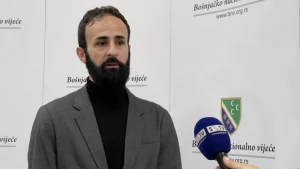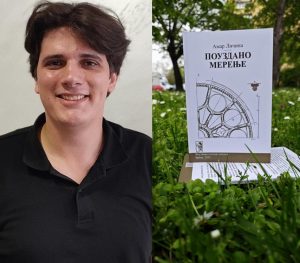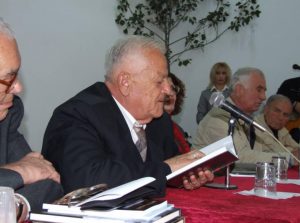The 3rd World Haiku Seminar
Itabashi Green Hall, Tokyo, 29 April 2014
土谷直人(ペーパー)スマイル・ドゥルミシェヴィッチ句集『野薔薇のかおり』コメント(夏石番矢代読)
Naoto Tsuchiya’s Comment about Smajil Durmisevic’s “ Fragrance of the Wild Rose” (Zenica, 2013) read by Ban’ya Natsuishi
Bosnian Haiku-poet Smajil Durmišević: Fragrance of the Wild Rose
Naoto TSUCHIYA
English adjusted by Jim Kacian
Smajil Durmišević is, first of all, a Bosnian haiku-poet. Bosnia is a country a bit unfamiliar to us, yet Bosnia and Herzegovina declared independence on 3 March 1992 and received international recognition on April 6, 1992, during the so-called Civil War of Yugoslavia. This Republic is primarily composed of three nationalities: Catholic Croatians, Islamic Bošniaks, and Orthodox Serbs. Drumišević is a Bošniak, the largest sectarian group comprising 48 percent of the whole population of 3,770,000. The Ottoman Empire captured Bosnia in 1463, and during their occupation many of the inhabitants converted to Islam, which remains true to this day.
His birthplace is, seemingly, a mountainous village, where one can lead a simple yet rich, one might say idyllic and utopian, life.
He graduated from the Medical Faculty in Sarajevo, where a gunshot in 1914 started the First World War. He is an associate professor at the University of Zenica. He has published many collections of poetry. He has been published in world literary magazines, including Mainichi Daily News and Asahi Haikuist Network in Japan. This is the barest outline of his profile.
He is both a lyric and epic poet, who sings of his hometown, his beautiful countryside, his loving Bosnia. But in this article I would like to focus on an appreciation of his personality and the specific character of his haiku from a Japanese point of view.
His haiku collection Fragrance of the Wild Rose is composed of four parts: “Tear”, “Fragrance of the Wild Rose,” “Scattered Pearls,” and “Flight of the Hawk.” This collection is dedicated to his wife, to his colleagues and friends, to his friends-poets, and to all who are courageous, sincere and benevolent.
He appears before us as a Bosnian patriot, an ardent lover of his native land, and so composes haiku about his žepa. The strong accent on Bosnian patriotism is the most important of his haiku.
an innocent beauty 四方八方
everywhere—žepa is a tear 無垢の美——ジェパは涙
take your shoes off 靴を脱ぎ祈り給え
you, the traveller, a friend 友なる旅人よ
do you feel the fragrance of our われらがボスニア魂の
Bosnian soul? 芳しい香を感じるかい?
Phrases and words like Bosanske duše「ボスニア魂」、and miris, Bosne「ボスニアの芳しい香、匂い」、「innocent無垢の」, appear repeatedly in his haiku. See here his superb sense of closure:
Bosnia a country ボスニアは
of man, stone and dreams 人、石そして夢の国
a divine omen 神の前兆
His deep-rooted vision is Islamic in nature. Beneath that there exists something akin to the animism of Japanese Shinto. Gods see everything on this world. What is not expressed via the mouth is important. Intuition and tacit understanding is extremely important. The poet is completely devoted to the religious world, an ardent admirer of his God and religious patrons and protectors. In his poetry we can easily perceive a combination, an alloy, an amalgamation of Muslim and Slavic culture.
the dawn of honey 蜜の朝焼け
and an ancient call—beware, 古き召命——気を付けなさい
innocent, write down everything 無垢なる善悪の二天使が全てを観そなわす
To this haiku he adds an annotation: As per Muslim learning, two angels sit on man’s shoulders and write down all his deeds, the good (right shoulder) and the bad (left shoulder). Thus nothing can be hidden from God.
a prayer in a Holy grove 聖なる森で
so as to the oak, 樫の木に向かって祈る
who are these people? この人たちは誰?
In Bosnia in the pre-Islamic age, just as in old Japan, people found gods in everything, in all the phenomena of Nature. There were gods of the forests, of rivers, of lakes . . . and of holy trees, where these gods resided. The oak was considered as the most sacred tree. After the downfall of socialism, nowadays, people visit these holy, sacred places, groves, caves . . . so the ancestors wake up and are surprised by visiting people. This haiku describes such a situation.
The Civil War in Yugoslavia indeed features in his haiku. The poet came from žepa, which in 1993 was home to a great genocide. In 1995 there came the Srpska (Serbian) army. So it is to be expected that he composes his haiku in light of these sorrowful events.
tombstones moved to the 墓石が博物館に
museum—yet they are 持ち去られーー本当は
all our kings! 我らの王様のものなのに!
villains, you should know 悪党よ、思い知れ
Hamid is waiting for you – shaheed 永遠の守護となって
on eternal guard ハミッドがお前等を待っているぞ
This second haiku is related to Saint Hamid. A defender in the county of žepa, killed on June 5, 1993, became a synonym for the Bosnian guardian. A neighbor, a loving man, abruptly became a criminal. A sad, unbearable reality to poets!
The civil war, genocide in Srebrenica, in žepa, the disintegration of Yugoslavia—alas!—these events were of little concern to most Japanese people here in the peaceful far East. His every haiku reminds us of those events, incidents and accidents in Bosnia, unthinkable, unbearable nowadays to us Japanese. His haiku, mostly anti-war haiku, his works are precious and valuable, because they express these fearful years!
ta divlja ruža the wild rose 野薔薇が咲き誇り、
cvjeta, miri i bode blooms, smells discreetly and stings 慎重に香り、刺す
raste gdje hoće it grows where it wants 好きな所に生きる
ljeto u Pragu Summer in Prague, プラハの夏
u trenu spazih jednu suddenly I noticed ああ、ここに
arapsku ružu an Arabian rose アラビア種の薔薇!
His contemplation of rose is sincere and deep. Here are two examples. He honestly preserves haiku’s fixed form: 5+7+5, as is evident, if you count the number of his vowels in the South Slavic originals. We can say that this makes his haiku very short, makes them quite close to the spirit of haiku. In the end, I must add, he also composes a lot of tanka fairly well.








